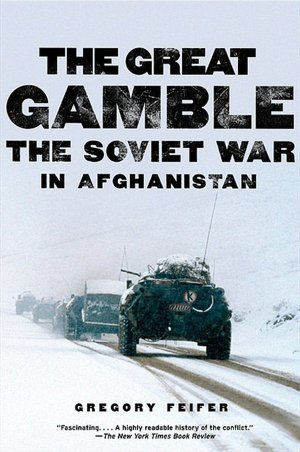I just finished reading The Great Gamble: The Soviet War in Afghanistan by Gregory Feifer. The book seeks to tell the story of the Soviet participation in the civil war in Afghanistan that took place in the last decade of the Soviet Union's existence.
As Feifer tells the tale, a Communist government in Kabul was in trouble in 1979, perhaps largely due to modernization policies much like those promoted by today's government, and asked for support from the Soviet Union. A few old men in the Kremlin decided to send troops in response, a decision that was rubber stamped by the nominal mechanism of the Soviet Government.
The decision in retrospect seems bizarre. Surely the decay of the Soviet institutions was the major threat to those decision makers, there seemed to be little importance to the USSR of Afghanistan, and those knowledgeable about Afghanistan realized how unlikely it was that military intervention would achieve Soviet goals at an acceptable cost to the USSR.
Feifer describes a very flawed Soviet military operation, poorly supplied, manned by conscripts, brutal to those conscripts, using weak tactics, that lasted for a decade. The intervention was for a while successful in that the Afghan government was able to increase the strength of its army, and Soviet economic aid brought some benefits to the Afghan economy. (I recall that the Soviet army played the major role in beating the armed forces of Nazi Germany in World War II, suggesting that it was capable of fighting well and hard even if it did so in ways that we Americans would not expect.)
On the other hand, according to Feifer, the Soviet military intervention was countered by supplies of equipment to the insurgents from Pakistan, the United States, Saudi Arabia, Iran, and even China. Moreover, tens of thousands of foreign fighters eventually entered Afghanistan to fight on the side of the insurgents.
Late in the war, very sophisticated equipment received by the insurgents turned the tide in the war, new leadership (by different old men) in the Kremlin tired of the war and turned their attention to more serious and more pressing issues, ordering an end to Soviet participation in the war.
The decade long war was disastrous for the Afghans, leaving their country a shambles.
The book made interesting reading. It is journalistic rather than historical writing in the sense that it is based very much on what participants told the author about the war, rather than on more formal sources used by professional historians. People tell reporters what they want to tell them, and even if they seek to tell the truth it is the truth as they see it and as they remember it.
I was an adult during the Soviet Afghan war, but I found that I wanted to know a lot more about Afghan culture than Feifer was going to tell me. That culture is very complex, with an urban-rural divide, a conservative-modern Islamic divide as well as a Sunni-Shiite divide, ethnic divides based on language and tribal identities, and a long history of feuds and internecine rivalries. Clearly Afghanistan is very poor, with problems of poverty more reminiscent of a land-locked African country than say those of Viet Nam or Iraq.
Similarly, I found myself wanting to know more about the relationships among the southern Soviet Republics of Turkmenistan, Uzbekistan and Tajikistan, Pakistan, Iran, China and India and Afghanistan. It would seem clear that not only do each of those countries have political interests in Afghanistan, but they have tendencies to support different groups within Afghanistan.
It is only in the last chapters of the book dealing with the aftermath of the war that Feifer mentions the disconcerting practice of the Afghans not only to make temporary deals with their enemies, but to change sides during campaigns or even during battles. This is a tendency that strikes me as similar to those of wars of a very distant past.
Feifer suggests that the inner circle of the Bush administration seems to have acted in 2001 much as the old men in the Kremlin did 22 years before, and that the Afghan people have come to dislike the NATO soldiers much as they came to dislike the Soviet soldiers. The British in the 19th century, if I understand history correctly, left Afghanistan to the Afghans unless and until they took some action that impinged negatively on the British, at which time they retaliated so strongly as to make those in power in Kabul think several times against such further actions. That might have been the better path for the United States in 2001.
I suggest others will enjoy the book, but read it as I did with access to the Internet at hand to help looking up appropriate references. I recommend especially "Afghan Ethnic Groups".
Afghan Ethnic Groups
 |
| Source: Debate Asia |

No comments:
Post a Comment